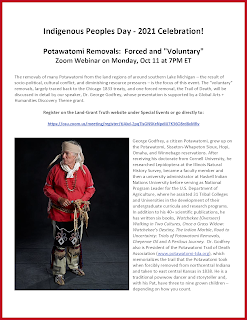"Indigenous peoples are inheritors and practitioners of unique cultures and ways of relating to people and the environment. They have retained social, cultural, economic and political characteristics that are distinct from those of the dominant societies in which they live. Despite their cultural differences, indigenous peoples from around the world share common problems related to the protection of their rights as distinct peoples.
 |
| Playing Indian by Phillip J. Deloria |
Complimentary copies of the book are available to the first 100 registrants who reside in Licking County. Participants may pick up a book at any public library in Licking County or request that a copy be mailed to their home address. A limited number of free e-books and e-audio books are available to download through any of the public libraries in Licking County.
 |
| PDF of October 11, 2021 Zoom Event Free Community Book Club. English OCR Text Enabled. |
3 PM on October 11th
Register to attend this virtual event at any public library in Licking County or contact Laura Walsh at 740.364.9514 or walsh.276@osu.edu.
Playing Indian explores how white Americans have used their ideas about Native Americans to shape national identity in different eras — and how Indian people have reacted to these imitations of their native dress, language and ritual. The Boston Tea Party, the Order of Red Men, Camp Fire Girls, Boy Scouts and Grateful Dead concerts are just a few examples of white Americans' tendency to appropriate Indian dress and act out Indian roles.
Deloria suggests that imagining Indians has helped generations of white Americans define, mask and evade paradoxes stemming from the simultaneous construction and destruction of
these native peoples. In the process, Americans have created powerful identities that have never been fully secure.

Deloria is a professor of history at Harvard University, where his research and teaching focus on the social, cultural and political histories of the relations among American Indian peoples
and the United States, as well as the comparative and connective histories of indigenous peoples in a global context. He is also a trustee of the Smithsonian Institution’s National Museum of the American Indian, where he chairs the Repatriation Committee. Along with Erika Doss, he is the series editor of CultureAmerica, a University Press of Kansas series focused on American cultural history.
One Book, One Community is made possible through the Melissa Warner Bow endowed fund. The Licking County Foundation, United Way of Licking County, The Energy Cooperative Operation Round Up Foundation and Park National Bank are also sponsoring the event.
 |
| George Godfrey (Citizen Band Potawatomi) in regalia. Image Courtesy of George Godfrey. |
October 11, 2021
7 PM
Free, Registration required for Zoom Event.
https://osu.zoom.us/meeting/register/tJAkd-2pqTIsGNSKeNpdiIJ7K36O8rd8xMRv
 |
| PDF of October 11, 2021 George Godfrey Event Flyer. English OCR Text Enabled. |
George Godfrey, a citizen Potawatomi, grew up on the Potawatomi, Sisseton-Whapeton Sioux, Hopi, Omaha, and Winnebago reservations. After receiving his doctorate from Cornell University, he researched Lepidoptera at the Illinois Natural History Survey, became a faculty member and then a university administrator at Haskell Indian Nations University before serving as National Program Leader for the U.S. Department of Agriculture, where he assisted 31 Tribal Colleges and Universities in the development of their undergraduate curricula and research programs. In addition to his 40+ scientific publications, he has written six books, Watchekee (Overseer) Walking in Two Cultures, Once a Grass Widow: Watchekee’s Destiny, The Indian Marble, Road to Uncertainty: Trials of Potawatomi Removals, Cheyenne Oil and A Perilous Journey. Dr. Godfrey also is President of the Potawatomi Trail of Death Association (www.potawatomi-tda.org), which memorializes the trail that the Potawatomi took when forcibly removed from northcentral Indiana and taken to east central Kansas in 1838. He is a traditional powwow dancer and storyteller and, with his Pat, have three to nine grown children ‒ depending on how you count.
For more information, visit: https://u.osu.edu/landgranttruth/special-events/ .
- Newark Earthworks Center
- Find out about more Indigenous Peoples' Day events on our American Indian Events Calendar
- Indigenous Land Acknowledgement
- Midwestern & Mound Building Nations
- American Indian Studies
- Multicultural Center | Office of Student Life
- Office of Diversity and Inclusion
- Chickasaw Nation.tv
- Countering an Euro-Centric View
- European Explorers: The Native Perspective
- Columbus Day: We Celebrate Piominko Day
- Great Lakes Inter-Tribal Council
- National Congress of American Indians (NCAI)
- United Nations
- Indigenous Peoples at the United Nations
- United Nations Declaration on the Rights of Indigenous Peoples
- [PDF available in English | Español | Français | Русский | عربي | 汉语; and an adolescent-friendly version.]
- International Day of the World's Indigenous Peoples, August 9
- Federally Recognized Tribal Leaders Directory | United States Department of Interior Bureau of Indian Affairs
- "Map: Making Indigenous Peoples Day official across the country"
- Aliyah Chavez, Indian Country Today, October 11, 2019.
- "Columbus Day or Indigenous Peoples' Day?"
- Leila Fadel, NPR, October 14, 2019.
- "Q & A on Indigenous Peoples' Day with Dr. Daniel Rivers"
- The Ohio State University, October 5, 2018.
- "Ohio State Student Government Votes in Favor of Resolution to Keep Columbus Day, Introduce Indigenous Peoples' Day on Campus"
- Teresa Cardenas, The Lantern, October 25, 2017.
- Celebrate Indigenous Peoples' Day at Ohio State Newark!
- October 2019.
- Instead of Columbus Day, some U.S. cities celebrate Indigenous Peoples' Day
- October, 2015.
No comments:
Post a Comment